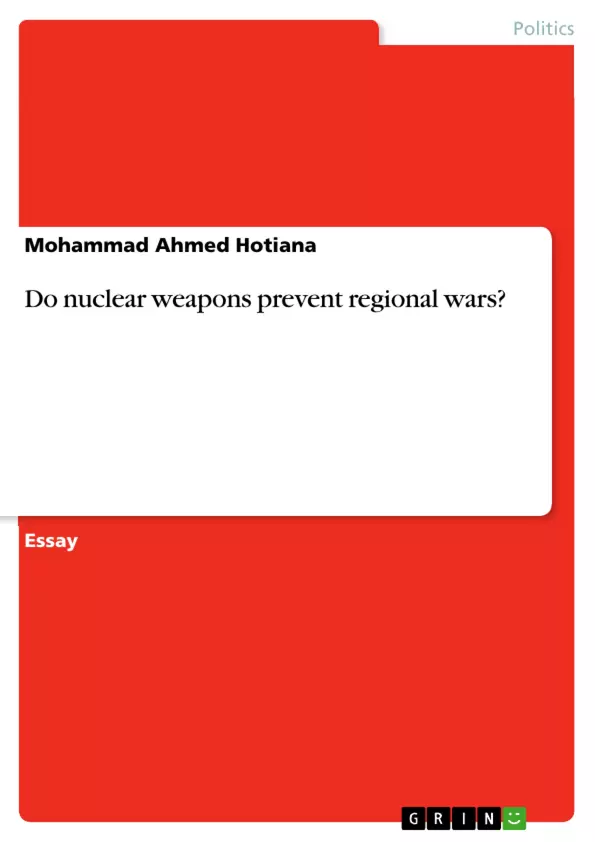On the 6th of August 1945, United States military air crafts flew over the Japanese cities of Hiroshima and Nagasaki releasing two nuclear fission (atomic) bombs. The atomic bomb is probably the deadliest weapon of mass destruction ever used in recorded history. This deadly weapon was created by the United States under the Manhattan Project with the collaboration of Canada and the United Kingdom during 1930-40.
In this research paper we shall use the example of the South Asian Nuclear crisis in order to find answers to the following questions that would help us come up with a logical conclusion to the original question .i.e. “do nuclear weapons prevent regional wars”
1. What is the extent of damage nuclear weapons of today can do?
2. What are the pros and cons of a world with nuclear weapons?
3. What do earlier events have to say about it?
4. Would new nuclear states behave differently if equipped with nuclear weaponry?
Inhaltsverzeichnis (Table of Contents)
- Introduction
- Nuclear Weapons and Regional Wars
- The Extent of Damage
- Pros and Cons of a World with Nuclear Weapons
- Past Events and Nuclear Weapons
- The Behavior of New Nuclear States
- Kenneth Waltz and the Bi-polar World
- The Stability of Bi-polarity
- The Case of India and Pakistan
- The Challenge of Incapable Governments
- Conclusion
Zielsetzung und Themenschwerpunkte (Objectives and Key Themes)
This research paper investigates the argument that nuclear weapons prevent regional wars. By examining the history of nuclear weapons, their potential consequences, and the behavior of nuclear-armed states, it aims to answer the question of whether nuclear weapons act as a deterrent to conflict.
- The destructive power of nuclear weapons and their potential consequences
- The impact of nuclear weapons on international relations and regional stability
- The role of nuclear weapons in the Cold War and the potential for conflict between states like India and Pakistan
- The dangers posed by nuclear weapons in the hands of incapable or unstable governments
- The question of whether new nuclear states would behave differently than established nuclear powers
Zusammenfassung der Kapitel (Chapter Summaries)
- Introduction: This chapter introduces the topic of nuclear weapons and their potential role in preventing regional wars. It begins by outlining the historical context of nuclear weapons, specifically the bombing of Hiroshima and Nagasaki, and the subsequent efforts to control their proliferation.
- Nuclear Weapons and Regional Wars: This section explores the argument that nuclear weapons deter regional wars, examining the potential consequences of such weapons and the potential for nuclear accidents or miscalculation. It also raises the question of whether new nuclear states would behave differently than established ones.
- Kenneth Waltz and the Bi-polar World: This chapter examines the theory of Kenneth Waltz, who argues that a bi-polar world with two dominant powers, such as the Cold War era, can be more stable than a world with multiple nuclear-armed states. Waltz believes that the potential for nuclear war is a powerful deterrent, making nations more cautious and less likely to engage in conflict.
- The Stability of Bi-polarity: This section questions the stability of Waltz's bi-polar world model, arguing that a world with widespread nuclear proliferation may lead to increased instability and unpredictable behavior by nuclear-armed states.
- The Case of India and Pakistan: This chapter examines the relationship between India and Pakistan, two neighboring countries with nuclear weapons, and explores the potential for conflict and the impact of nuclear weapons on their rivalry.
- The Challenge of Incapable Governments: This section raises concerns about the potential dangers of nuclear weapons in the hands of incapable or unstable governments. It explores the potential for miscalculation, accidental use, and the difficulty of controlling nuclear weapons in such contexts.
Schlüsselwörter (Keywords)
The main keywords and focus topics of this research paper include nuclear weapons, regional wars, deterrence, nuclear proliferation, international relations, stability, bi-polarity, India, Pakistan, and incapable governments.
Frequently Asked Questions
Do nuclear weapons prevent regional wars?
The paper investigates this by examining the South Asian Nuclear crisis, weighing deterrence theories against the risks of miscalculation.
What is Kenneth Waltz's theory on nuclear stability?
Waltz argues that a bi-polar world with nuclear weapons can be more stable because the potential for total destruction makes nations more cautious.
What are the dangers of nuclear proliferation?
Risks include nuclear accidents, miscalculations by unstable governments, and the unpredictable behavior of new nuclear-armed states.
How does the India-Pakistan relationship fit into this study?
It serves as a case study for regional nuclear rivalry and the potential for conflict between neighboring nuclear-armed states.
What was the Manhattan Project?
It was the secret U.S.-led project during the 1930s-40s, with help from Canada and the UK, that developed the first atomic bombs used in 1945.
- Quote paper
- Mohammad Ahmed Hotiana (Author), 2015, Do nuclear weapons prevent regional wars?, Munich, GRIN Verlag, https://www.grin.com/document/337131



